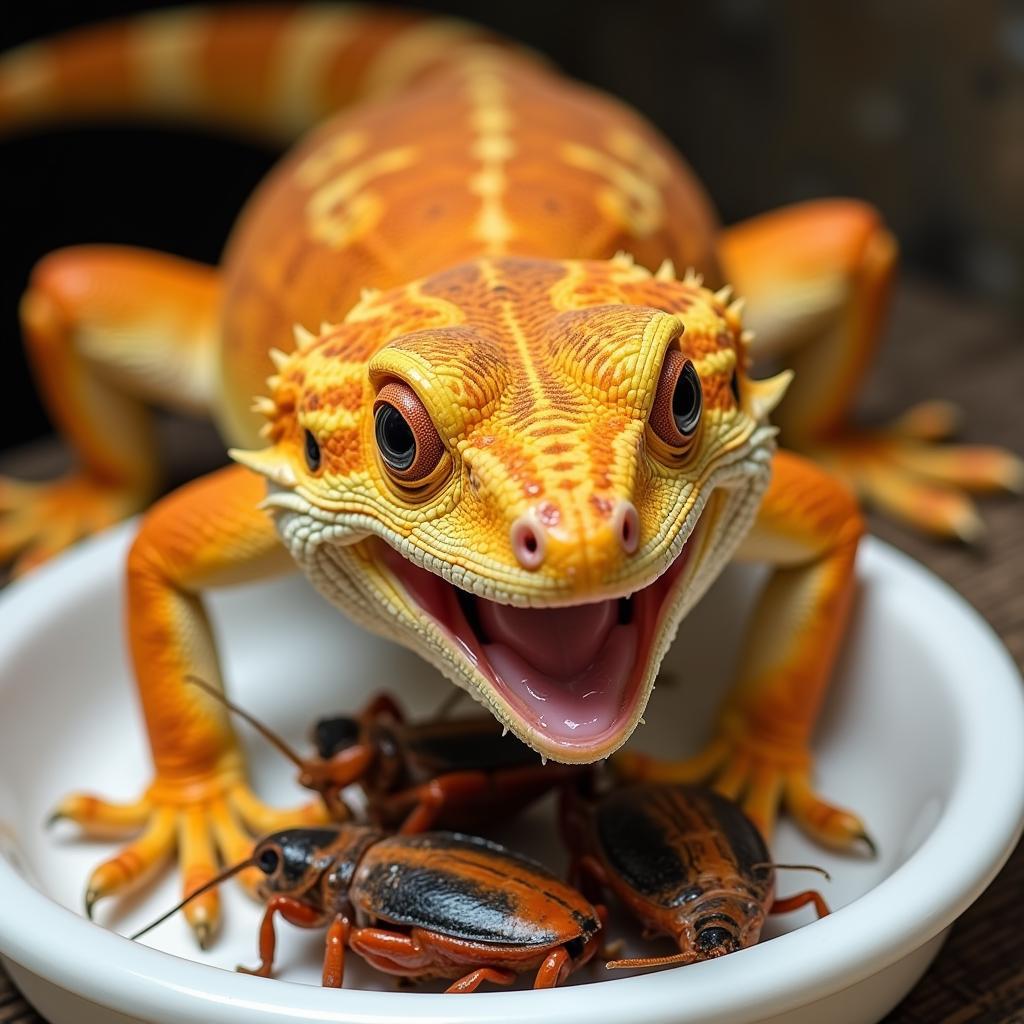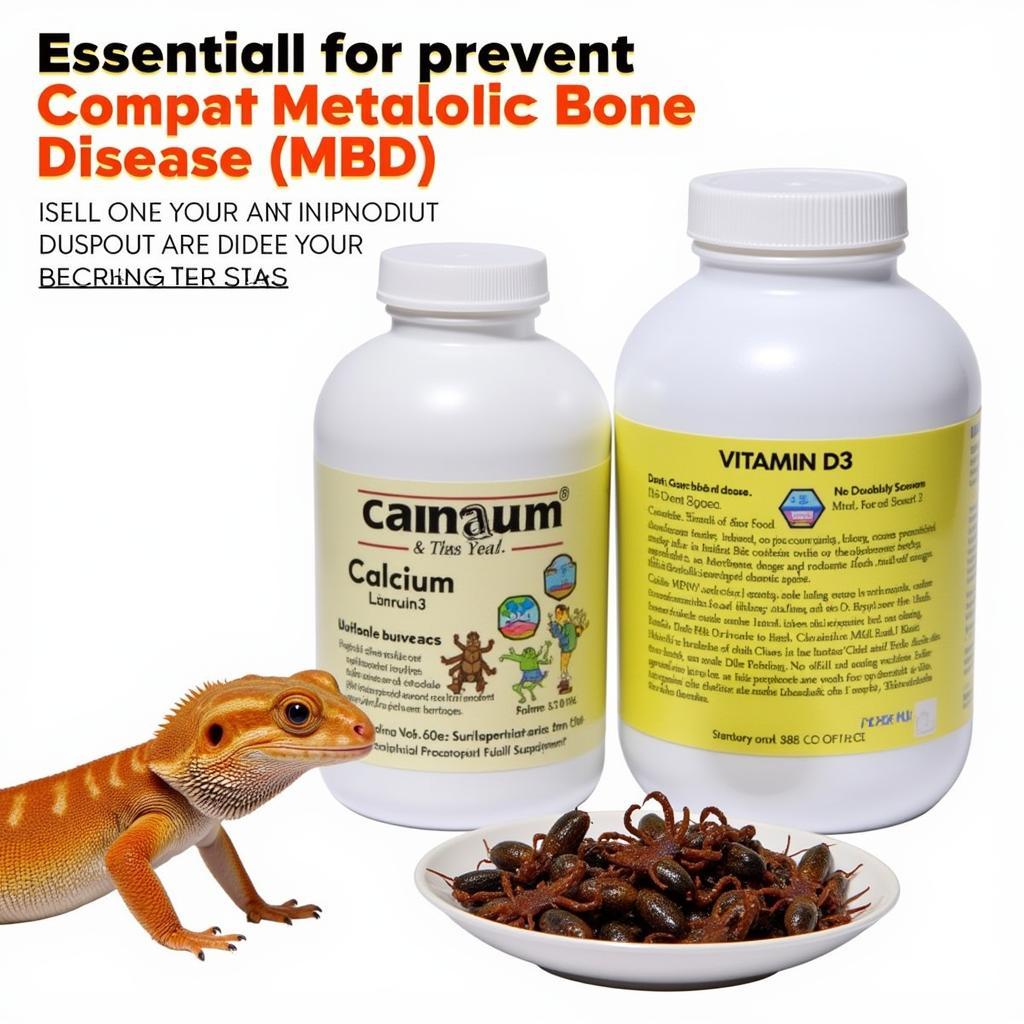A bearded dragon’s diet is crucial for their health and well-being. Finding a reliable Bearded Dragon Food List Pdf can be challenging, so we’ve compiled everything you need to know about feeding your beardie a balanced and nutritious diet. This guide will explore safe fruits, vegetables, insects, and supplements, ensuring your scaly friend thrives.
What Do Bearded Dragons Eat? A Detailed Bearded Dragon Food List
Bearded dragons are omnivores, meaning their diet consists of both plants and animals. The ratio of these food groups changes as they grow. Baby bearded dragons (up to 6 months) require a diet higher in protein, consisting primarily of insects. As they mature, the proportion of plant matter increases. Adult bearded dragons (over 6 months) should primarily consume vegetables and leafy greens with insects offered as supplemental protein.
Essential Insects for a Healthy Bearded Dragon Diet
Insects are a vital source of protein for bearded dragons. Here are some safe and readily available options:
- Crickets: A staple insect for beardies, offering a good balance of nutrients.
- Dubia Roaches: Another excellent protein source, higher in protein and lower in chitin than crickets.
- Mealworms: Offer in moderation due to their high fat content.
- Waxworms: A tasty treat, but high in fat, so offer sparingly.
- Silkworms: Another high-protein, low-fat option that can be beneficial for growth.
 Bearded dragon enjoying a meal of crickets
Bearded dragon enjoying a meal of crickets
Nutritious Vegetables and Greens for Your Bearded Dragon
Leafy greens and vegetables should form the bulk of an adult bearded dragon’s diet. These provide essential vitamins and minerals.
- Collard Greens: A nutritional powerhouse packed with vitamins A, C, and K.
- Mustard Greens: Another excellent source of vitamins and minerals.
- Turnip Greens: Offer in moderation due to their high oxalate content.
- Dandelion Greens: A good source of calcium and other nutrients.
- Butternut Squash: A sweet and nutritious treat, rich in vitamins A and C.
- Bell Peppers (all colors): Offer a variety of colors for a wider range of nutrients.
Fruits: Occasional Treats for Your Beardie
Fruits should be offered sparingly as treats due to their high sugar content. Here are some safe options:
- Apples (peeled and cored): Offer in small pieces.
- Berries (strawberries, blueberries, raspberries): A tasty and occasional treat.
- Mango: Offer in moderation due to its high sugar content.
- Melon (cantaloupe, watermelon): Hydrating and refreshing, but limit portions.
Supplements: Ensuring a Balanced Diet
While a varied diet should provide most necessary nutrients, supplementing with calcium and vitamin D3 is crucial to prevent metabolic bone disease (MBD). Dust insects with a calcium and D3 supplement before offering them to your beardie.
Bearded Dragon Food List PDF: Why You Might Not Need One
While a bearded dragon food list PDF can seem helpful, it’s often more beneficial to understand the principles of a balanced beardie diet. This allows for more flexibility and adaptation to your dragon’s individual needs and preferences.
“A healthy bearded dragon diet isn’t about following a rigid list, it’s about understanding the nutritional needs of your pet and providing a variety of safe and appropriate foods,” says Dr. Emily Carter, a renowned reptile veterinarian.
 Calcium and Vitamin D3 supplements for bearded dragons
Calcium and Vitamin D3 supplements for bearded dragons
Creating a Balanced Meal Plan for Your Bearded Dragon
A balanced meal plan should consist primarily of vegetables and greens for adult dragons, with insects offered several times a week. Baby dragons, on the other hand, require insects daily. Remember to always offer fresh, clean water.
“Variety is key! Just like us, bearded dragons benefit from a diverse diet. Don’t be afraid to introduce new, safe foods to keep their diet interesting and ensure they receive a wide range of nutrients,” adds Dr. Carter.
Conclusion: Feeding Your Bearded Dragon for Optimal Health
Feeding your bearded dragon a nutritious diet is essential for their overall health and longevity. While a bearded dragon food list PDF can be a starting point, understanding the principles of a balanced diet will enable you to provide your beardie with the best possible nutrition. Remember to offer a variety of safe insects, vegetables, and occasional fruits, along with necessary supplements.
FAQ
- What are the best insects to feed my bearded dragon? Crickets and dubia roaches are excellent staple insects.
- How often should I feed my adult bearded dragon insects? Several times a week is sufficient.
- Can bearded dragons eat spinach? Spinach is high in oxalates and should be avoided.
- What are the signs of MBD in bearded dragons? Signs include lethargy, weakness, and deformed limbs.
- How can I ensure my bearded dragon stays hydrated? Always provide fresh, clean water in a shallow dish.
- What should I do if my bearded dragon refuses to eat? Consult a veterinarian.
- Are there any toxic foods for bearded dragons? Yes, avoid avocados, onions, garlic, and rhubarb.
Need more help? Check out our other articles on bearded dragon care! For further assistance, contact us at Phone Number: 02437655121, Email: minacones@gmail.com Or visit us at: 3PGH+8R9, ĐT70A, thôn Trung, Bắc Từ Liêm, Hà Nội, Việt Nam. We have a 24/7 customer support team.